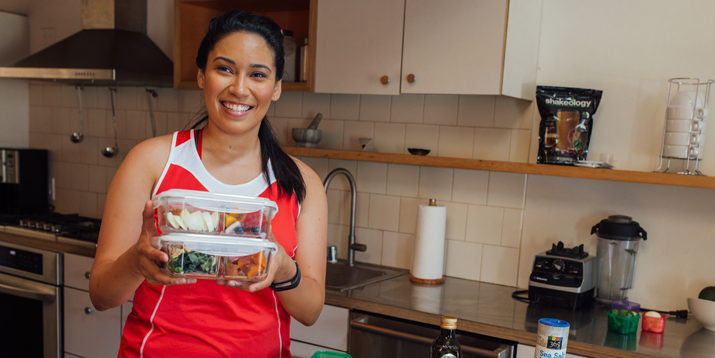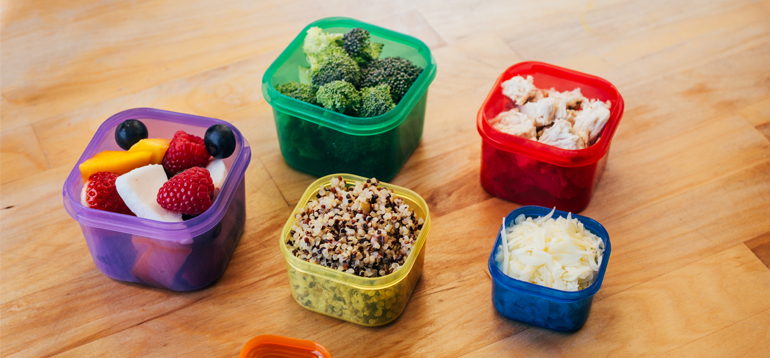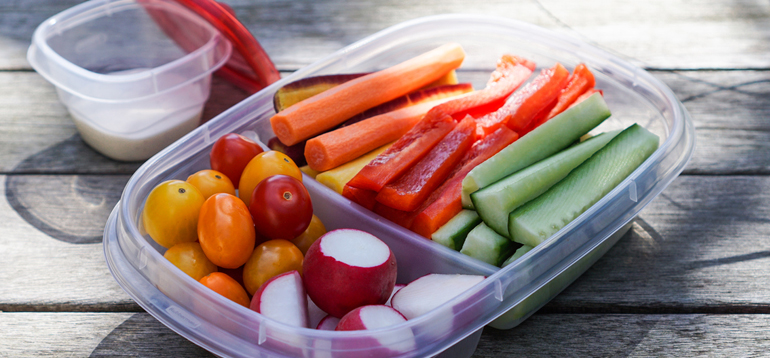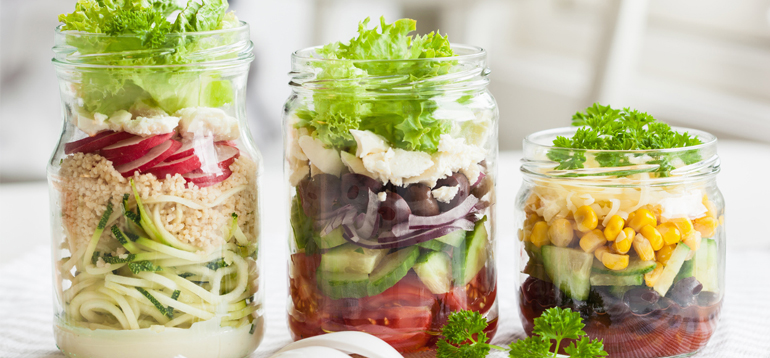Why Meal Planning Works for Weight Loss

When your schedule is already jam-packed, meal planning might seem like just one more task to add to your to-do list.
But there’s a reason so many people swear by meal planning for staying on track — it takes the guesswork out of healthy eating, which makes it easier to reach your weight-loss goals.
Portion control is an essential part of meal planning. Using portion-control containers means no elaborate calculations or weighing — that’s what the containers are for.
A nutrition program like Ultimate Portion Fix teaches you to perfectly portion every single meal, every time so that instead of playing a guessing game with portion size, you’re getting well-fed and well-fueled.
“Meal planning is like a blueprint for your day,” says Scott Shreiber, D.C., L.D.N., C.N.S., a chiropractic physician and licensed dietitian/nutritionist in Delaware. “You know when and what you’ll eat, and you’ll be less apt to grab whatever [else] looks good.”
5 Ways Meal Planning Can Help With Weight Loss
If you like to play things by ear, planning every meal and snack a week in advance might be way outside your comfort zone — how are you supposed to know right now if you’ll be in the mood for veggie chili in four days?!
OK, first of all, it’s always a good day for veggie chili. But more importantly, nutrition plays a huge role in weight loss — and meal planning can make it much easier to eat healthy.
Here’s how meal planning can help you lose weight.
1. Meal Planning Conserves Willpower
It’s kind of a catch-22: Research shows we love having a ton of choices, yet those choices can stress us out and lead to decision fatigue.
All the food decisions you make throughout the day can slowly chip away at your willpower — but planning your meals in advance can keep you from having to rely on willpower in the first place.
“Having the foods ready to go is half the battle,” says Lisa Hayim, M.S., R.D., at The Well Necessities. “The majority of less-than-healthy choices happen when we’re not prepared.”
Planning your meals may take a little extra effort at the beginning of the week, but it means you’ll know exactly what to reach for the next time you’re hungry.
And you can save all that leftover willpower for when you really need it, like when your alarm goes off for your morning workout.
2. You’ll Make Better Food Choices

The idea of having infinite options sounds great in theory — but when you’re exhausted and hungry and you don’t have a game plan, you’ll probably just end up making the same old fallback meal (frozen chicken wings, anyone?) or ordering the usual takeout grub.
“‘Throwing something together’ will usually lead to unbalanced meals,” Schreiber says.
After all, it’s hard to make healthy choices when you’re hungry. Meal planning helps you get all those decisions out of the way at once — at the beginning of the week, while you’re still feeling relaxed and recharged and motivated.
And meal planning doesn’t have to be boring — research has shown that people who plan their meals not only choose more nutritious foods, but also eat a better variety.
It may be a more structured way of eating than you’re used to but think of it as an opportunity to finally try some of those healthy recipes you’ve had bookmarked for ages.
3. You’ll Cut Back on Mindless Eating
You’re hungry for a snack, so you grab a handful of almonds… then another… then another. Before you know it, you’re halfway through the tin, and suddenly your “healthy” snack has tacked on a few hundred extra calories.

When you’re hungry or stressed or tired, it’s easy to eat mindlessly and give in to cravings.
Researchers have found that we make more than 200 food decisions a day — and most of them are made while our brains are on autopilot, which means we’re more likely to eat out of habit or let visual cues (like oversized plates) influence our portion sizes.
In fact, some experts say fullness plays a secondary role in determining how much we eat — we tend to eat whatever’s on our plate, so our calorie consumption can be decided before we even sit down at the table.
That’s why meal planning can help you lose weight by allowing you to eat more mindfully — you’re taking the time to think through your meals and choose nutritious food rather than just grabbing whatever’s available when hunger strikes.
“Planning a weekly menu increases mindfulness for what you’re eating, which results in healthier food choices and less room for junk food,” says Cate Ritter, a certified nutritionist and owner of Cate’s Nutrition Kitchen.
And meal planning isn’t just for meals — you can (and should!) put healthy snacks on the schedule each day.
Snack choices can make or break your diet, Schreiber says, so it’s important to have a game plan for those, too.
4. You’ll Make Room in Your Schedule for Other Things
Yes, there’s a time commitment — at the beginning of the week, you’ll invest a few hours planning out your schedule, shopping for healthy ingredients, and batch-prepping your meals.
But you won’t waste time before every… single… meal rummaging through the kitchen, trying to figure out what to cook.
You can just heat and eat the meals you already planned and prepared.
And if you feel like there are never enough hours in the day, meal prepping once a week can free up a few extra minutes each day to squeeze in a workout or even just get to bed a little earlier.
5. It Will Give You Confidence in the Kitchen
Some people feel right at home in the kitchen, others — not so much. And if you’re not confident in your cooking skills, then you’re probably not going to be too excited to try new, healthy recipes.
But one of the great things about meal prepping is that you don’t have to be a Top Chef; you can create an easy, buffet-style meal prep and simply mix and match your meals for the week.
As you cook more and become more comfortable in the kitchen, you can gradually build up your meal preps repertoire.
But in the end, you do you: If you know what you like to eat, then go ahead and eat the same breakfast for a week, or cook up several days’ worth of dinners and put them on repeat.
How to Meal Plan for Weight Loss (Even If You Don’t Like Cooking)
Even if you’ve never prepared anything more complicated than a cheese quesadilla, have no fear — there are plenty of recipes and resources that can help you with the meal-planning process.
Keep it Simple:
Just because you’re planning in advance, it doesn’t mean you’re required to come up with something elaborate.
All you need is a list of healthy snacks and easy go-to meals you can mix and match throughout the week. Here are a few to get you started:
- 15 Healthy Breakfast Ideas
- 5 Simple Lunches You Can Make Using Portion Fix Containers
- 10 Comfort Food Recipes to Try in Your Next Meal Prep
- 9 Genius Slow Cooker Tips for Easy Meal Prep
- 15 Easy One-Pot Meals
- 21 Easy Meal-Prep Snacks
- Vegan Versions of 8 of Your Favorite Shakeology Recipes
Start With a Plan

No points are awarded for meal-planning originality, so go ahead and borrow your favorite ideas from other people’s meal plans.
Here are some of our favorites:
- 1,200–1,500 Calorie Level Meal Prep in 90 Minutes or Less
- Almost No-Cook Meal Prep for the 1,500–1,800 Calorie Level
- CORE DE FORCE Meal Prep for the 1,800–2,100 Calorie Level
- Make This Hearty Winter Meal Prep for the 2,100–2,300 Calorie Level
Brush up on Your Cooking Skills
The more confident you become in the kitchen, the more adventurous and appetizing your meal plans can be. If you want them to, that is — it’s totally fine to stick with simple recipes and one-pot dishes forever if that’s what keeps you on track.
But if you’re looking to take your culinary skills up a notch — or at least figure out how to cook a chicken without drying it out — these resources can help.
- A Guide to Cooking Terms for the Domestically Challenged
- How to Avoid These 9 Common Cooking Mistakes
- Kitchen Tools You Don’t Need (And a Few You Do)
- 6 Healthy Spices That Amp Up Flavor (not Calories)
- 12 Food Storage Tips to Make Your Groceries Last Longer
- How to Make All Your Leftovers Taste Great
Chapter 4: What to Eat to Lose Weight
How Many Calories Should I Eat? | Should You Count Macros?

